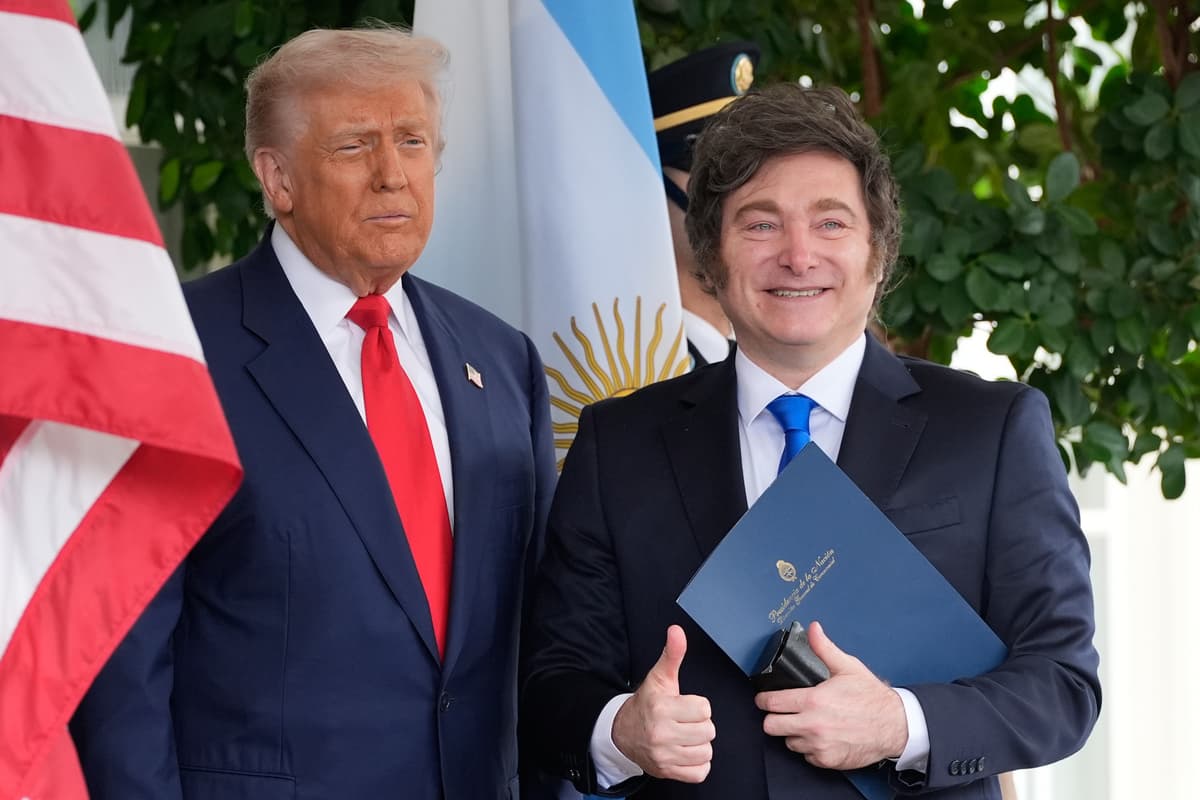World
Trump Signals U.S. Support for Argentina Depends on Election Outcome

President Donald Trump has stated that the United States will not invest time or resources in Argentina if current President Javier Milei loses the upcoming midterm elections. This remark came during Milei’s visit to the White House, where he secured a significant $20 billion currency swap aimed at alleviating Argentina’s financial crisis.
During their meeting, Trump expressed optimism about Milei’s prospects in the elections for Argentina’s legislative body set for later this month. He remarked on Milei’s polling numbers, suggesting they were “pretty good,” and predicted improvement following the announcement of the financial deal. “Our approvals are somewhat subject to who wins the election,” Trump noted, highlighting a possible shift in U.S. policy based on the electoral outcome.
Trump’s comments extended to the potential opponent Milei may face, whom he described as “extremely far left.” He attributed Argentina’s current difficulties to the opposing philosophy, asserting that U.S. support would diminish if Milei were to lose. “If he loses, we are not going to be generous with Argentina,” Trump added, emphasizing his belief in Milei’s victory. “If he does win, we’re going to be very helpful.”
The deal, which many view as a form of bailout for Argentina’s struggling economy, has drawn criticism from some U.S. lawmakers. Senator Elizabeth Warren of Massachusetts condemned Trump’s actions, arguing that propping up a foreign government while domestic issues persist is contradictory to the “America First” policy he promotes. “It is inexplicable that President Trump is propping up a foreign government, while he shuts down our own,” she stated, highlighting the potential burden on American taxpayers.
Senator Jeanne Shaheen, also a Democrat, weighed in on the controversy, suggesting that Trump’s priorities are misplaced. “President Trump seems to think it’s more important to offer $20 billion to bail out Argentina than it is to make a bipartisan deal to prevent health insurance premiums from spiking for over 20 million Americans in a matter of days,” she criticized.
Economic experts have also voiced concerns regarding the implications of the deal. Monica de Bolle, a senior fellow at the Peterson Institute for International Economics, described the arrangement as a bailout, saying, “It’s a country in crisis, it’s running out of dollars, and the U.S. is giving the country dollars. That’s a bailout by definition.”
As the midterm elections approach, the focus remains on how the outcome will affect U.S.-Argentina relations and whether American support will be contingent on the electoral results. The upcoming vote could reshape the dynamics of international aid and economic cooperation, underscoring the interconnectedness of domestic politics and foreign policy.
-

 Science2 months ago
Science2 months agoInventor Achieves Breakthrough with 2 Billion FPS Laser Video
-

 Health2 months ago
Health2 months agoCommunity Unites for 7th Annual Into the Light Walk for Mental Health
-

 Top Stories2 months ago
Top Stories2 months agoCharlie Sheen’s New Romance: ‘Glowing’ with Younger Partner
-

 Entertainment2 months ago
Entertainment2 months agoDua Lipa Aces GCSE Spanish, Sparks Super Bowl Buzz with Fans
-

 Health2 months ago
Health2 months agoCurium Group, PeptiDream, and PDRadiopharma Launch Key Cancer Trial
-

 Top Stories2 months ago
Top Stories2 months agoFormer Mozilla CMO Launches AI-Driven Cannabis Cocktail Brand Fast
-

 Entertainment2 months ago
Entertainment2 months agoMother Fights to Reunite with Children After Kidnapping in New Drama
-

 World2 months ago
World2 months agoIsrael Reopens Rafah Crossing After Hostage Remains Returned
-

 Business2 months ago
Business2 months agoTyler Technologies Set to Reveal Q3 Earnings on October 22
-

 World2 months ago
World2 months agoR&B Icon D’Angelo Dies at 51, Leaving Lasting Legacy
-

 Health2 months ago
Health2 months agoNorth Carolina’s Biotech Boom: Billions in New Investments
-

 Entertainment2 months ago
Entertainment2 months agoRed Sox’s Bregman to Become Free Agent; Tigers Commit to Skubal









